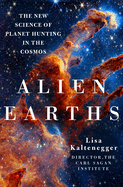
Looking for life on other planets requires understanding what such life might look like. As astrophysicist Lisa Kaltenegger, the founding director of Cornell University's Carl Sagan Institute, demonstrates in Alien Earths: The New Science of Planet Hunting in the Cosmos, it also requires understanding numerous scientific disciplines, including biology, geology, astronomy, and engineering. Kaltenegger narrates the story of cosmic development and her journey toward the exploration of a universe vaster than the mind can comprehend, yet more intimate than readers may realize. She helps readers grapple with impossible concepts, such as highlighting how long Earth existed before humans appeared, by comparing the planet's timeline to a single 24-hour day. Descriptions of her surroundings ground readers on Earth while they consider the possibility of other life-supporting planets.
Kaltenegger balances authoritative expertise and childlike enthusiasm, relating scientific discoveries along with the human connections that led to them. Anecdotes about traveling on a student's budget and bringing her daughter to a satellite launch enrich stories about pivotal encounters with colleagues. Kaltenegger challenges the misconception of scientific research as "stuffy and rigid" through tongue-in-cheek comments, as when she compares the Big Bang to the baking of raisin bread, but contends that "the Big Raisin Bread Expansion is probably not as catchy a name as the Big Bang." And Kaltenegger invites readers into her research experience as she reflects on "every dreamer who had ever looked up at the stars and wondered--it had taken all of us to get here." Alien Earths is an absorbing read that imparts knowledge, cultivates appreciation for scientific inquiry, and inspires wonder and delight. --Dainy Bernstein, freelance reviewer

